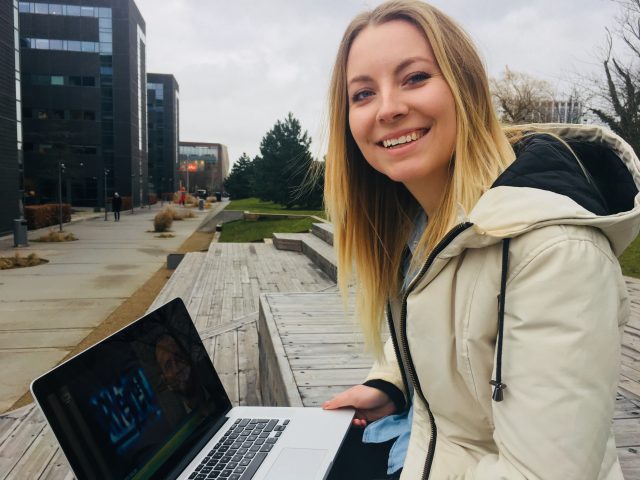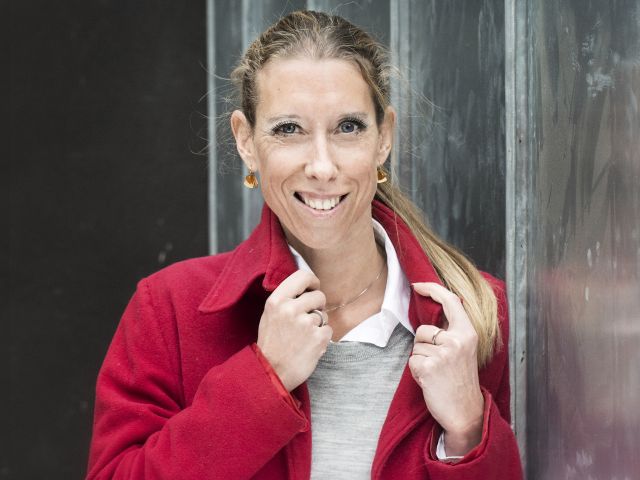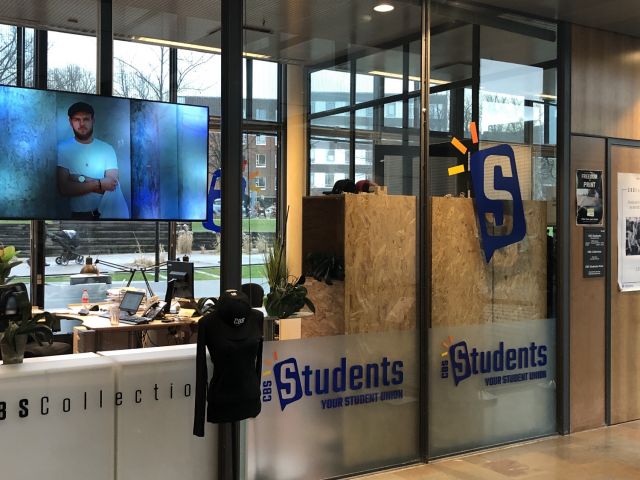What should CBS’ new strategy cover? Five people from CBS have some ideas

(GIF: Emil Ernst Friis)
More time for staff representatives, excellent teaching and research, outreach to society, inclusive and innovative learning environments. CBS is midway through drawing up a new strategy to replace the current one. CBS WIRE has talked to five people from different corners of CBS about their wishes for the new strategy.
Since 2017, CBS’ strategy has had the title ‘Business in Society’. Now, the calendar is saying 2020, and it is time to make a new strategy for 2021 and onwards.
The process of piecing together a new strategy began in March 2019. Since then, the Senior Management have had meetings with internal and external stakeholders in order to gather information and opinions about the new strategy.
This has concluded in six strategic scenarios, including ‘CBS as the learner-centric Business School’; ‘CBS as the Transformative Business University’; and ‘CBS as Europe’s best research-driven broad Business School’.
The scenarios are being discussed in three rounds with Heads of department, the EDU Leadership Team, the Admin Leadership Team and the students, and will eventually lead to a proposal for ambitions and key priorities in mid-March. On June 3, the final draft of the strategy will be approved.
During the process, the President of CBS, Nikolaj Malchow Møller has urged the staff and faculty of CBS to share their wishes for what should be included in the strategy. So, CBS WIRE has asked various people from CBS what they think the strategy should cover.
Alex Klinge – Equal Opportunities Officer
CBS will be expected to attract talented young people across Danish society, and CBS will be expected, through our graduates, to supply diversity in conscientious leadership across Danish society.
1: I would like to see a strategy which recognizes that, in future, CBS needs to attract students who would not now see CBS as an obvious choice.
CBS also needs to prepare for a future where competition for talent will increase from vocational education and training, from the STEM sciences and from alternative providers of business education. So we need to consider our outreach and to establish a closer dialogue with our key stakeholders, regarding future students.
2: Moreover, in order to attract and educate them, we must provide learning environments which are inclusive and innovative, and which equip students with a norm-critical perspective. In that way, CBS can have a positive transformative impact on individuals, organizations and society.
3: I would also like to see a strategy which ensures that a similarly wide selection of our most talented students become integrated into our research environments. The strategy must also ensure that they can pursue an academic career in which, according to their talents, they can and will progress in a transparent manner all the way to the top leadership positions in academia, be it as professor, dean or president. Who knows, maybe even as Equal Opportunities Officer?
The way career progression, promotion and selection have played out until now seems to result in fairly fixed and narrow demographic profiles populating specific segments of CBS. And why is that so important? As an ambitious business university, we simply must to tap into the full pool of talents in order to produce the most innovative and ground-breaking research and the most inspired teaching and learning environments. Moreover, our staff need to project role models that are recognized by a broader population of students.
Let’s start the transformation.
Tine Silfvander, Shop Steward for the technical and administrative staff at CBS
For me, it is of great importance that the new strategy includes a wording about the fact that staff representatives must be given the necessary working time and space for involving. So the CBS management and the staff representatives can work with the common goal of creating the best workplace for all CBS employees.
It is important that the CBS management informs and keeps staff representatives informed about CBS’s conditions on an ongoing basis. Just as it is important that the CBS management and staff representatives are responsive and respect each other’s views and work through a constructive and forward-looking dialogue, to achieve the best result for the employee, always with a common focus on good job satisfaction and a good work-life-balance. So CBS can continue to be a substantial and attractive workplace for all its employees.
Kristian Miltersen, Professor at the Department of Finance and Chair of the Academic Council
The Academic Council would like the strategy to address both of the core areas of CBS’ business, namely research and teaching.
- We believe that high-quality research is THE foundation in order to perform excellent teaching, quality fundraising, and insightful dissemination. High-quality research is the foundation in order to be able to attract the best faculty, and at the same time, attracting the best faculty is the way to maintain producing high-quality research.So attracting and hiring the right faculty really has this positive snowball effect. Moreover, excellent teaching is, of course, also the way to attract the best and most motivated students at all levels from bachelor to PhD and also executives. It is also the way to be successful in external fundraising, as the most prestigious grants are given to the best researchers.
2. Research freedom is as important as quality in research for many reasons. We need critical (research-based) voices in a free society and lots
of new creative ideas.
3. The Academic Council discussed but did not reach consensus about how much research should be ‘guided’ to solve our society’s current
grand challenges (whatever those are and whoever determines what they should be).
The views span from our main goal being to educate students who will then be able to address and solve those challenges, either as
entrepreneurs, innovators, or future researchers to the view that it is part of our ‘contract’ with the government that CBS should direct its
researchers to identify and focus directly on ‘solving’ those challenges – or at least incentivize it by nudging interdisciplinary research and
more individual-researcher risk taking.
This last viewpoint clashes to some extent with research freedom and therefore fundamentally with the idea that the individual researcher
probably knows best how she or he can contribute best to society.
- This is not to say that life-long learning and sustainability should not be in the strategy. In fact, most members think these elements should be included in it. But our main view is that we can only help society with these grand challenges when we do have a very strong (and free) research foundation and tradition.
In a nutshell, the Academic Council would like the strategy to address both research and teaching and to acknowledge the great snowball effect of research quality and research freedom.
Our rector, Nikolaj Malchow-Møller, who is also a member of the Academic Council, puts it this way: ‘We should think of the strategy as the guiding ambition for CBS.’ I like this way of thinking about the strategy very much. The balance is to formulate the ambition so it is something we all believe is the right thing to strive for and that it includes both research and teaching goals, but on the other hand, one should not make it too much into key point indicators that can be measured with high accuracy.
Jens Gammelgaard, Head of Department of International Economics, Government and Business
The CBS strategy should pave the way for how we as an institution reach out to society. Reaching out encapsulates addressing societal challenges, collaboration with other scientific disciplines, and engagement with society at large.
The strategy should have the ambition to develop research of the highest quality and the ambition to develop our teaching to fulfill both current and future job-market demands, also focusing on the so-called Nordic Nine capabilities and broader inclusion of students.
Ole Helmersen, Shop Steward and member of the General Consultation Committee (HSU)
Ole Helmersen would rather focus on the implementation process that naturally follows after the strategy has been finally approved.
From the perspective of the General Consultation Committee, we clearly expect that CBS’ Senior Management will allocate the necessary resources required for the implementation of the revised strategy.
We have noted that quite a lot of money has been set aside for strategy implementation over the next 3-4-year period. When the ‘new’ strategy has been completed and approved by the board, it will be necessary to work on the details of what organizational changes it may entail and how the competences of staff, academic as well at administrative, match the strategic initiatives.
From the employee side, we will demand that sufficient resources be set aside for the necessary competence development, including, as a very important element, time for staff to engage in such activities.






































































































































Great input and perspectives on the strategy